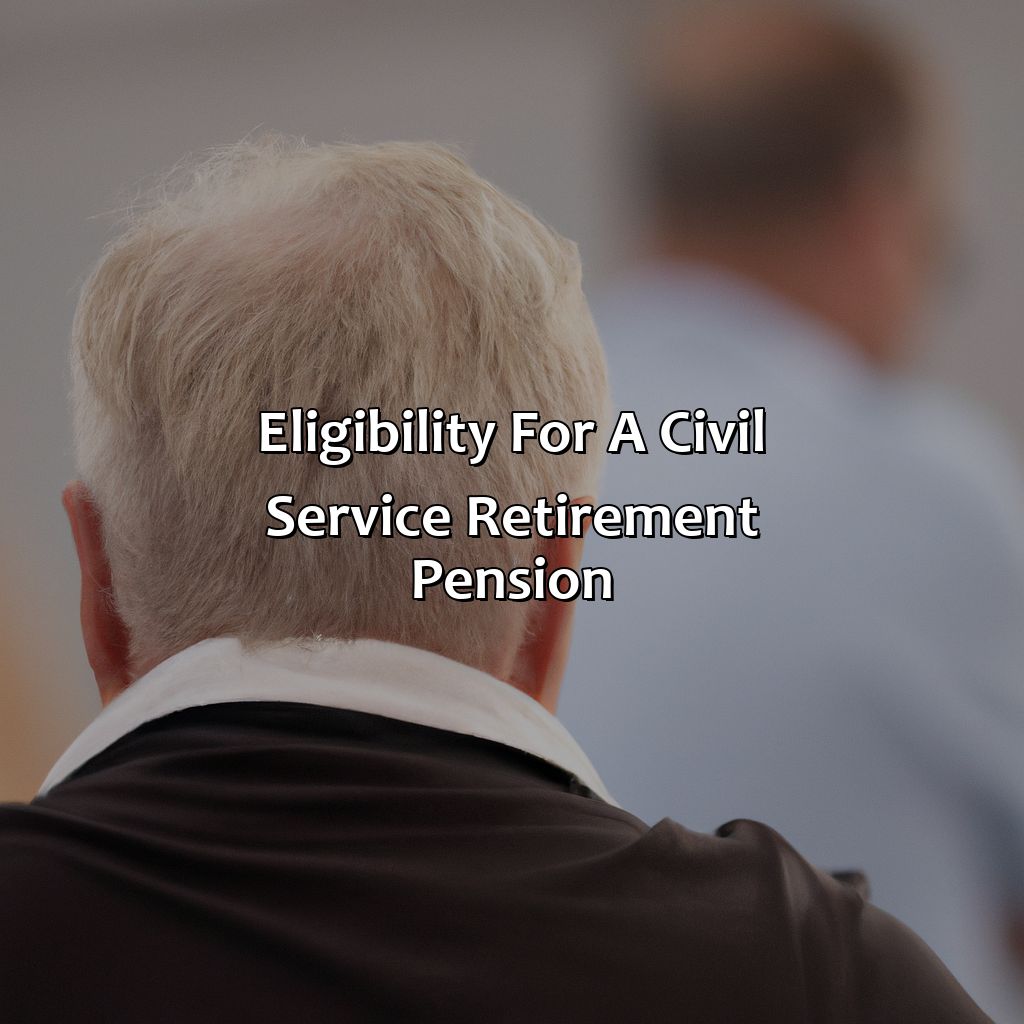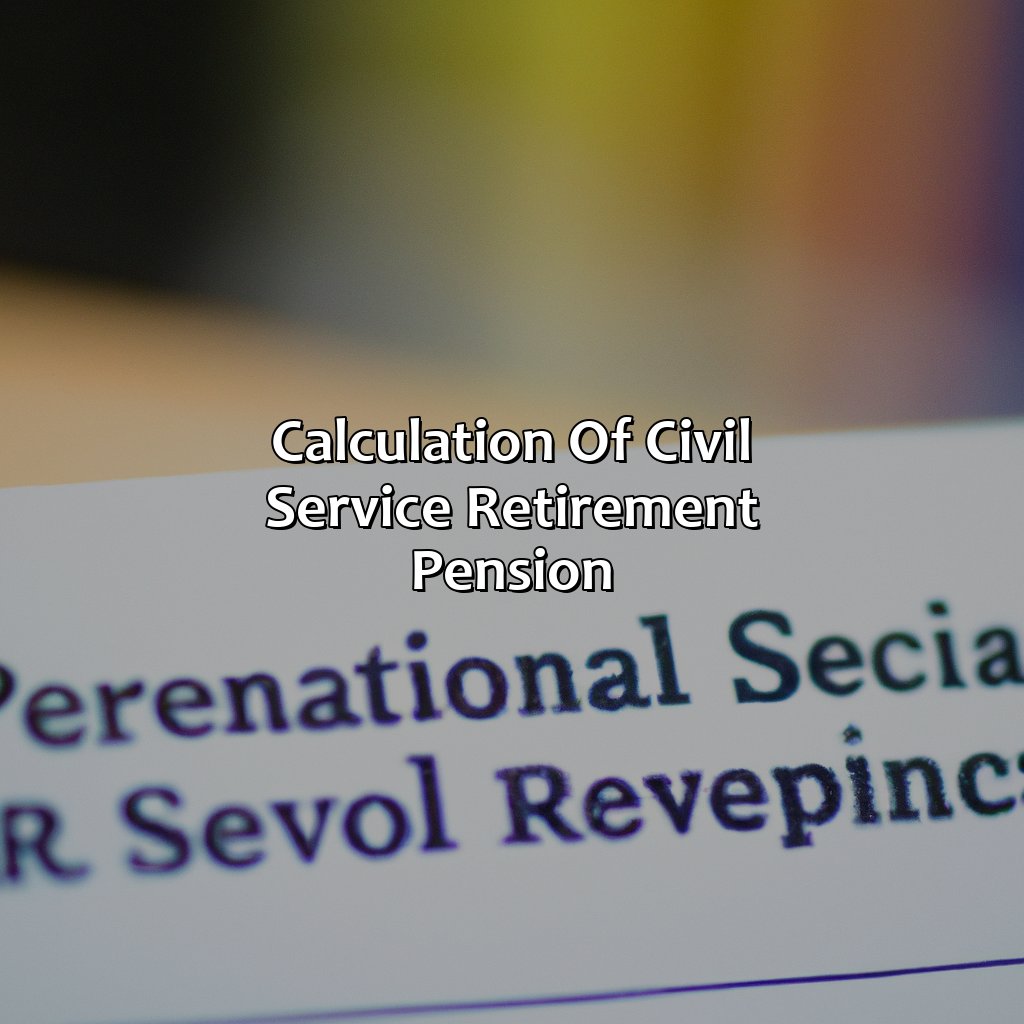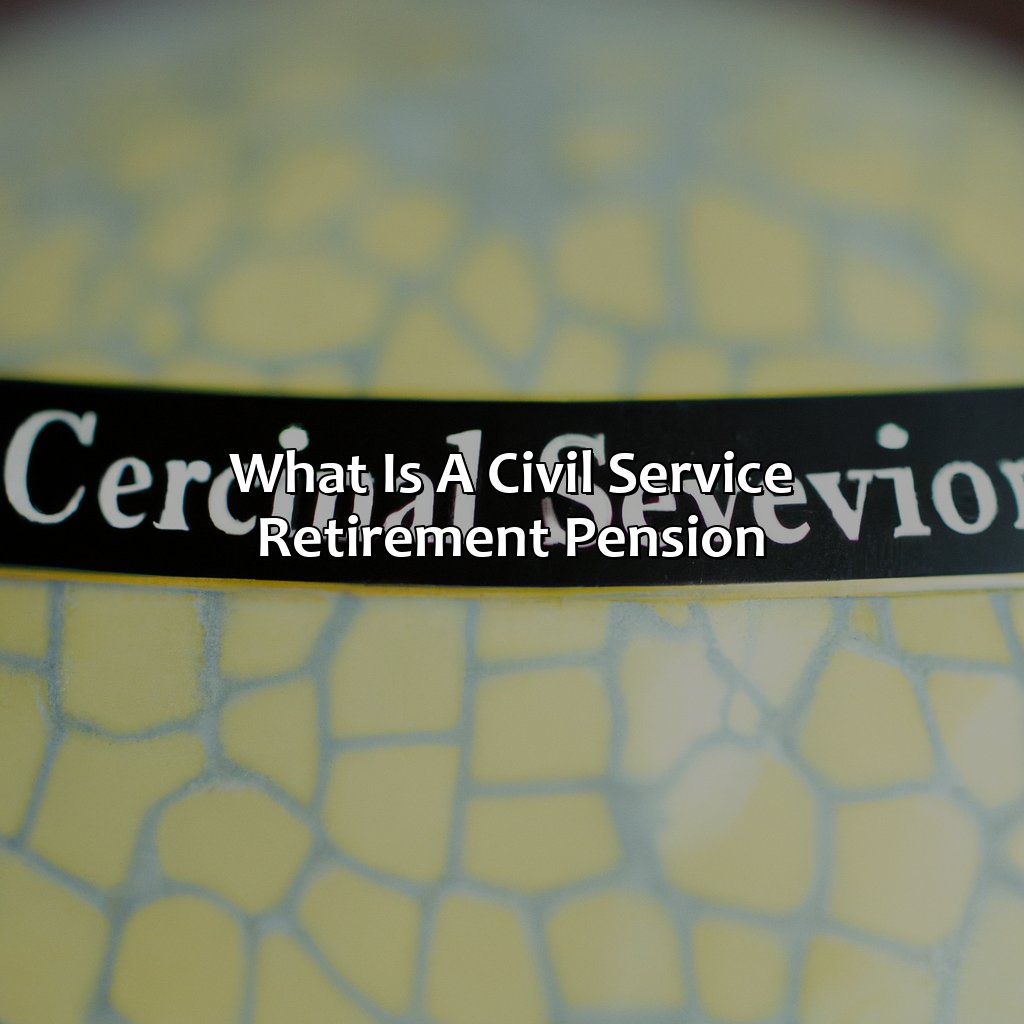What Is A Civil Service Retirement Pension?
Key Takeaway:
- A Civil Service Retirement Pension is a retirement plan for eligible federal employees that provides a source of income in their retirement years.
- Eligibility for a Civil Service Retirement Pension is based on a combination of factors such as length of service and age. This eligibility is determined by the Office of Personnel Management.
- The calculation of a Civil Service Retirement Pension takes into account the High-3 Average Salary, the number of Years of Service, and the Multiplier. This calculation determines the amount of the pension payments.
- There are three options for receiving a Civil Service Retirement Pension: an Immediate Annuity, a Deferred Annuity, or a Lump-Sum Payment. Each option has its own set of pros and cons, so employees should choose the option that best suits their individual needs.
- Additional benefits of a Civil Service Retirement Pension include Cost-of-Living Adjustments, Survivor Benefits, and Health and Life Insurance Benefits.
Are you considering retirement but unsure of how the civil service pension works? Learn about this vital form of financial security and prepare for the future with confidence! You can easily make educated decisions regarding your retirement plan with the right knowledge.
What is a Civil Service Retirement Pension?
Civil Service Retirement Pension – An Informative Guide
A Civil Service Retirement Pension is a retirement plan available to individuals who have worked for the civil service. This pension scheme is designed to provide financial support to individuals in their retirement years. The amount of pension income an individual receives is based on various factors such as their length of service, contributions made, and salary. Learn more about pension funds and how they can help you plan for retirement.
The Civil Service Retirement Pension is a defined benefit plan, meaning that the amount an individual receives is predetermined based on their years of service and salary. This pension scheme is considered a generous retirement benefit, providing a guaranteed income stream for individuals in their retirement years.
One unique feature of the Civil Service Retirement Pension is its protection against inflation. The pension benefits are indexed to inflation, ensuring that the purchasing power of the pension does not decrease over time due to inflation.
To maximize the benefits of the Civil Service Retirement Pension, individuals can consider contributing to additional pension plans such as a personal pension, a workplace pension, or an individual retirement account (IRA). These plans offer tax benefits and can provide additional retirement income on top of the Civil Service Retirement Pension.
Overall, the Civil Service Retirement Pension provides a secure and valuable retirement benefit to individuals who have worked for the civil service. It is important for individuals to understand the eligibility requirements, benefit structure, and any additional pension plans available to them to make informed decisions regarding their retirement savings.

Image credits: retiregenz.com by Adam Duncun
Eligibility for a Civil Service Retirement Pension
To get a civil service retirement pension, you must meet some criteria. You must have given a certain time of service and reach a certain age. These two points will be discussed below.

Image credits: retiregenz.com by James Duncun
Length of Service
The period of employment is a crucial factor in determining eligibility for a civil service retirement pension. The length of time an employee works reflects on their entitlement to benefits. Consequently, the longer an individual has been employed, the higher their payout would be when they retire.
Furthermore, when computing the duration of service, only credible and verifiable periods are considered. A probationary period or services under temporary status may not count towards the calculation unless these periods were credited by law or regulation. Moreover, if an employee transferred to another position in a government agency without separation from service, this will also be counted as continuous service.
In contrast, some exceptional situations may result in earlier eligibility for retirement pensions such as involuntary separation due to disability or because of reorganization and curtailment measures. These circumstances differ significantly from the standard qualifications. If you’re wondering specifically about an ER pension, you can find more information here.
According to a report obtained from the Office of Personnel Management (OPM), an eligible retiring federal worker with 30 years or more in service can receive an annuity equivalent to 56% of high-three average salary.
For civil servants, age really is just a number…as long as that number is 55 or over.
Age Requirements
The minimum age to qualify for a Civil Service Retirement Pension is 60. The applicant must have worked in the civil service for at least 10 years. The length of service also determines the amount of pension entitlement.
Furthermore, if an applicant leaves before attaining the required age and years of service, they may opt for deferred retirement and receive their pension once they attain eligibility criteria. Opting for early retirement may trigger cuts in eligible benefits. If you want to learn more, check out this informative article on occupational pensions.
Pro Tip: To avoid confusion when planning your financial future, it is advisable to regularly check with your Human Resources Department about any changes in eligibility criteria.
Get ready to crunch some numbers, because calculating your Civil Service Retirement Pension requires more math than a calculus exam.
Calculation of Civil Service Retirement Pension
To get your civil service retirement pension, you must think about 3 factors.
- High-3 Average Salary
- Years of Service
- Multiplier
Each of these is important to calculate your retirement pension. Here, we will talk about each factor quickly so you can comprehend how your pension will be worked out.

Image credits: retiregenz.com by Yuval Woodhock
High-3 Average Salary
The High-3 Average Salary refers to the average salary of a civil servant over any three consecutive years in their career. This calculation is crucial in determining the amount of retirement pension they will receive. This includes all basic pay and locality pay, but excludes bonuses or allowances. The annual salary for each year within the High-3 period is determined, added together, and divided by three to obtain this average.
It is important to note that the High-3 Average Salary calculation differs from the Final Pay method used in some other retirement plans. In the Final Pay method, only the salary of an employee’s final year is considered instead of an average over several years.
One pro tip for those planning their retirement is to carefully consider their High-3 period when making decisions about their career and promotions. Aim for higher salaries during this period to maximize your potential pension benefits.
Counting the years of service may feel like a life sentence, but at least you get a pension as parole.
Years of Service
Length of Service
The length of service is a crucial factor in calculating civil service retirement pensions. It refers to the number of years an individual has worked in a federal government position with a retirement plan. The calculation takes into account how long they served, their salary, and retirement age.
To calculate the length of service, one needs to keep track of all periods when enrolled in retirement plans. This includes military time, part-time work, or any unpaid leave taken during this period. Each year of service adds points to an employee’s total score. The higher the score, the greater the retirement income.
Wondering what is ERS pension on my payslip? Check out this helpful guide from RetireGenz.
It is essential to understand that the longer an individual works for the government, the higher their pension benefits will be. If someone leaves before reaching eligibility for a pension plan, they will not receive those benefits.
So it is beneficial to track your retirement benefits from day one on the job and consider them before deciding whether to continue with a federal position as your career. Consider your future carefully and optimize your salary while accruing as much length of service as you can because every year counts towards your future stability. Learn more about Category A state retirement pension and plan ahead.
I might need a calculator to figure out my retirement pension, but at least I won’t need one for basic math like adding salt to my food.
Multiplier
During the calculation of Civil Service Retirement pension, the rate at which the average high-three salary is multiplied determines the final retirement benefit. This figure is known as the ‘Rate’.
The multiplier is a critical factor when it comes to determining Civil Service Retirement pension. The ‘Rate‘ varies depending on different factors, such as age and years of service. In general, those who served longer receive higher multipliers while older employees receive lower multipliers.
It’s crucial to note that certain types of CSRS pension plans have various multipliers based on when an employee retires. Therefore, it’s recommended that employees work with their HR departments or read official guidelines from the Office of Personnel Management (OPM) for exact calculations.
If you’re interested to know more about retirement plans and pensions, you can read about the EE pension on our website.
To increase your eventual retirement income, you could consider deferring your retirement until you become eligible for a more favorable multiplier. Alternatively, options like contributing more towards your account or purchasing additional service credits can also positively impact your retirement benefits.
Retiring? Don’t worry, with a civil service retirement pension you’ll have more options than a kid in a candy store.
Options for Receiving a Civil Service Retirement Pension
Think about your options for a civil service retirement pension. You can pick:
- an immediate annuity
- deferred annuity
- lump-sum payment
Each of these has different advantages. So choose the one that’s best for your retirement.

Image credits: retiregenz.com by David Jones
Immediate Annuity
Funding Your Civil Service Retirement: Immediate Income Stream
One popular option for civil service retirement funding is an immediate income stream. This plan provides a lump sum payment to purchase an annuity that pays out a fixed monthly amount for life. The amount of the payout depends on your age, health, and prevailing interest rates at the time of purchase.
An immediate income stream offers stability and guarantees a steady source of income for life, regardless of stock market fluctuations or economic conditions. Additionally, it eliminates the need to manage investments or worry about market performance in retirement.
If you’re wondering about retirement plans, you may want to consider pay as you go pension plan and learn more about it.
However, it’s important to carefully consider the terms and fees associated with an annuity before making any purchases. It may be helpful to consult with a financial advisor who specializes in retirement planning.
Consider all available options for receiving your civil service retirement pension before making any decisions that will affect your future financial security. You should know what’s S pension so that you can plan accordingly.
Overall, an immediate income stream can provide peace of mind and certainty during retirement years, but careful research and consideration are necessary to make informed decisions based on individual circumstances.
If you want to postpone your retirement, go for a deferred annuity – it’s like hitting the snooze button on your work life.
Deferred Annuity
A deferred annuity is a retirement payment that starts after a specific period. It is a form of defined benefit pension plan, where the retiree receives fixed payments based on their service and salary. The annuity remains an excellent option for those who may want to spend maximum time outside work before receiving their pension.
The deferred annuity payment can start as early as age 62 or as late as age 70, depending on the employee s duration of service with the civil service. The UK state pension provides a similar system. The longer the service, the higher the benefits. Moreover, it allows retirees to adjust their financial plans because they have more time to prepare for retirement expenses.
It’s crucial that disclosure of any other pensions in place should be considered since receiving benefits from two or more sources changes your tax bracket. The US government records thousands of federal employees who approximate $60 million dollars in deferred payment alone between 2013-16.
If you prefer your retirement funds all at once, a lump sum payment is like winning the jackpot, but without the champagne and confetti.
Lump-Sum Payment
A one-time payment of retirement funds, known as a Cash Bonus, can be obtained by civil service employees. This option allows the pensioner to withdraw a portion of their total pension amount in cash before receiving the rest in monthly installments. The lump sum payment option is an attractive choice for those who prefer having instant access to a large sum of money. However, it may not be suitable for retirees who want a consistent income stream and don’t want to risk spending all their money too quickly.
It’s essential to understand that the lump-sum payment amount is calculated based on various factors, including years of service and salary history. Pensioners should also consider tax implications when selecting this payout option, as taking out a sizable cash bonus could push them up into higher tax brackets.
Suppose you’re interested in pursuing this option and aren’t sure where to begin or seek advice from other retired colleagues who elected for a cash bonus at retirement. One such retiree stated that although the lump sum amount was tempting initially, they regretted not opting for monthly payments because they underestimated how long their savings needed to last once they stopped working. In summary, choosing between monthly payments or a lump-sum payout depends on individual financial goals and needs.
Retiring from the civil service may mean saying goodbye to your coworkers, but at least you’ll have a pension to keep you company.
Additional Benefits of a Civil Service Retirement Pension
Delve into the extra advantages of a civil service retirement pension. Cost-of-living adjustments, survivor benefits, health and life insurance benefits are all included! Learn about these benefits today.

Image credits: retiregenz.com by Joel Woodhock
Cost-of-Living Adjustments
Civil Service Retirement Pension recipients may receive yearly adjustments to their benefits to account for fluctuations in the cost of living. These adjustments, also known as COLA increases, can help retirees keep up with inflation and maintain their standard of living. The adjustment is calculated based on changes in the Consumer Price Index (CPI) and can vary year to year.
COLA increases are particularly beneficial for those who have been retired for a significant amount of time as they help mitigate the effects of inflation over an extended period. Additionally, increases are locked in once they occur, so retirees don t need to worry about future changes affecting their pension benefit levels.
It’s worth noting that while cost-of-living adjustments are a valuable feature of civil service retirement pensions, not all pension plans include them. It’s crucial for retirees to review their plan carefully and understand what benefits they’re entitled to receive.
According to a report from the National Institute on Retirement Security, nearly one million retirees rely solely on civil service pensions for income security. If you’re wondering how a pension is paid out, it typically depends on the plan you have and the options you chose at retirement. Some plans offer a lump sum payment while others provide monthly payments for the rest of your life.
“Who says you can’t take it with you? With survivor benefits, your loved ones can enjoy your civil service retirement pension long after you’re gone!”
Survivor Benefits
When unexpected events occur, it’s essential to feel secure in knowing that your loved ones are taken care of. Here are some significant points about the benefits provided to survivors of civil service retirement pension holders:
- Protection: If a retirement pension holder passes away, their surviving spouse can continue to receive a portion of the pension each month.
- Eligibility: The survivor must meet certain eligibility requirements, such as being married to the holder for at least 9 months before their passing.
- Options: Surviving spouses can elect to receive either a reduced monthly benefit or an annuity paid out over their remaining lifetime.
Furthermore, these benefits are automatic and don’t require additional enrollment or paperwork by the retiree. These plans help relieve some anxiety surrounding financial stability and allow the focus to shift towards coping with grief.
A retired civil servant, named Thomas, had been married for over two decades when he passed away suddenly. Thankfully, his wife received survivor benefit checks regularly without any interruption and continues to live comfortably thanks to her late husband’s pension plan.
Health and Life Insurance Benefits.
The retirement benefits for civil service employees include various perks, one of which is the provision of health and life insurance. These benefits provide much-needed security for those who are enjoying their retirement years.
- Health insurance covers the medical expenses of an individual.
- Life insurance provides financial support to the family in case something happens to the retiree.
- Dental and vision coverage is also included in some cases.
- Long-term care benefits ensure that retirees are cared for if they become incapacitated due to illness or injury.
It is worth noting that these benefits vary based on the jurisdiction and can change based on a number of factors like age, location, etc. Thus, newly retired individuals must investigate what coverage options are available to them before making decisions.
Pro Tip: Retirees should keep themselves updated regarding any changes in retirement benefit programs regularly.
Five Facts About Civil Service Retirement Pensions:
Civil Service Retirement Pensions are retirement benefits provided to eligible federal civil servants. (Source: Investopedia)
These pensions are based on a formula that takes into account an employee’s length of service and highest average salary over three years. (Source: OPM.gov)
Federal employees are eligible for retirement pensions after completing at least five years of service. (Source: FERSguide.com)
There are three types of civil service retirement pensions: FERS (Federal Employees Retirement System), CSRS (Civil Service Retirement System), and Hybrid Systems. (Source: MyFederalRetirement.com)
Civil Service Retirement Pensions are funded by a combination of employee contributions, employer contributions, and investment earnings. (Source: OPM.gov)
FAQs about What Is A Civil Service Retirement Pension?
What is a civil service retirement pension?
A civil service retirement pension is a type of retirement plan available to eligible employees of the federal government who have committed a certain amount of years towards their service.
Who is eligible for a civil service retirement pension?
Eligibility for a civil service retirement pension depends on the type of appointment one has. Generally, employees appointed to a career or career-conditional position are eligible.
How is the amount of a civil service retirement pension determined?
The amount of a civil service retirement pension is based on a formula that takes into account the employee’s years of service, the employee’s high-three average salary, and a multiplier.
When can an employee start receiving their civil service retirement pension?
An employee can start receiving their civil service retirement pension as early as age 55 with at least 30 years of service, or at age 60 with at least 20 years of service. However, the amount of the pension is reduced for those who retire before age 62.
Can an employee receive social security benefits in addition to their civil service retirement pension?
Yes, an employee who is qualified for both civil service retirement pension and social security can receive benefits from both sources.
What happens to an employee’s civil service retirement pension if they pass away?
If an employee who is receiving a civil service retirement pension passes away, their pension benefits may be passed on to their surviving spouse or other eligible survivor through annuity benefits.
 Checkout this IRS Loophole
Checkout this IRS Loophole 
